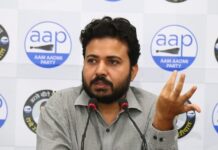Prof. Alok Pandey, Lal Bahadur Shastri Institute of Management, Delhi
New Delhi: Professor of Finance, Alok Pandey, spoke to Rahul Kumar, Senior Journalist (Asian Independent, UK) about the current economic situation of the country. Excerpts from the interview.
What is financial inclusion? Who are the people in India needs to be included and why?
Ans. Financial inclusion is defined as the proportion of individuals and firms that use financial services. Majority of Indians since independence were not included despite policy push by successive governments. The biggest push has come from the present NDA government through its PMJDY (Pradhan Mantri Jan Dhan Yojana) scheme and it has resulted in close to 80 percent of the citizens holding bank accounts (Business Standard, May 17, 2018).
Public Sectors Banks (PSBs) are bleeding due to NPAs. The respective governments in the center as well in the state permitted the predators to loot the public money. Whom do you blame? How further damage can be stopped?
Ans. Poor regulatory oversight, lax corporate governance standards, weak enforcement of economic laws and a slow judicial system along with nexus between politician, bureaucrat, and industrialists has led to the present state of affairs in the Indian banking system. The silver lining here is that the Govt. of India is hopeful that by end of this financial year most PSU banks would be out of PCA (Prompt Corrective Action) list of the Reserve Bank of India.
Subsidies and loan waivers have become a culture of our economic system. It is also alleged that most of the subsidies and loans are usurped by those who are wealthy and affluent landlords?
Ans. Poorly directed subsidies along with politically motivated loan waivers have wreaked havoc on Indian economy and its financial system. The poor and needy rarely benefitted. With emergence of Aadhar(Foundation), the biometrics-based citizen registry system, we hope that this problem can be resolved. Farmers with large landholding, though small in numbers have been politically very powerful in this country. They also have been the major beneficiaries of most loan waiver schemes in India. The policy makers are now thinking out of the box and are bringing out loan waiver schemes targeted towards small and marginal farmers. For instance, in the recent loan waiver scheme in the most populous state Uttar Pradesh (UP) for the first time, loans up to Rs 100,000 of small and marginal farmers were waived. There are around 23 million farmers in the state of Uttar Pradesh of whom, around 21.5 million fall in the ‘small and marginal’ category. Similar strategies have been adopted by other states in India as well.
Government loans earmarked for the upliftment of the weaker sections of the society are siphoned off by a nexus of corrupt politicians and bureaucrats. No government could break this nexus. What are the stringent measures you suggest to protect the interests of the most needy people of India?
Ans. Siphoning of loans meant for poor in India is a thing of the past. With improvements in IT infrastructure, banks, microfinance institutions, and other agencies involved in disbursement of loans are kept on a tight leash by their management and Reserve Bank of India along with agencies of central and state governments. There are close to 300,000 common services centres run by India’s largest e-governance company CSC e-Governance Services India Ltd (an SPV under Ministry of Electronics & Information Technology, Govt. of India) which has a reach to even remotest corner of the country to ensure that schemes and services of the central & state governments reach the poor and deprived so that they get benefitted through them.
Pradhan Mantri Mudra Yojana (PMMY) and schemes under it such as Shishu, Kishor, and Tarun could not generate income and create employment. According to several surveys and reports, people who have taken loan under these schemes did not set up any industrial unit to achieve the objectives of the schemes. Do you not think that the government of India has allowed the financial predators to loot the public money?
Ans. The Mudra Yojana is a novel and unique policy intervention. A recent RTI query has revealed that 90% of total loans disbursed have been small (Business Today-August 13, 2018) i.e. upto Rs 50,000/- only. It is almost impossible to start new industrial unit with this amount of money. Leading economists feel the such micro loans are only useful for small businesses like single cattle dairy farmers or some ‘thela wala’ (pushing hand cart for selling vegetables or sweetmeats) but it will not be sufficient to create substantial employment. The government needs to revisit and relaunch the scheme which is no doubt a boon for small entrepreneurs who are often starved for capital. It would be better to disburse loans only after a basic training has been imparted to the borrowers to become promising entrepreneurs. Most of the loans should be directed to fund innovative ideas rather than conventional business ideas.
GST, demonetization, or any other such economic reforms suffocated the industrial sectors; similarly export declined; SMEs shut down. What is your assessment on economic reforms?
Ans. One of the issues in implementation of GST was the revenue equalization principle. This resulted in skewed distribution of goods and services in different tax brackets. Thankfully policy makers have realized their mistake and the items under the highest tax bracket of 28% tax have been reduced to a bare minimum. News about the SME (Small & Medium Enterprises) shutting down is exaggerated. It is often based on lower credit off take by MSMEs (Medium Small & Micro Enterprises) from banks in the period of 2014- 17. Recent reports suggest that during the period of low credit off-take from banks i.e 2014-17, financing to MSMEs from NBFCs doubled in quantum. The export growth is finally picking up. What is needed is a correction in the external value of the Indian Rupee which has been overvalued in last few years compared to our competitors in global export markets. In fact, China continuously has allowed devaluation of its currency in order to maintain export competitiveness of its companies in global markets. I believe that the recent depreciation of Indian Rupee is a good sign and we would see a further upsurge in exports growth.
An economist or a politician; who is the best for the economic health of the country?
Ans. A politician who understands economics and can strike a balance between the contrasting views of several so called Indian and international economists would be best for the country. Rapid industrialization & formalization of the economy is the way forward for inclusive growth. India must relook and slowly move out of the services sector intensive model of the 1990’s.
You being an economist, corporates often blame that the graduates are unemployable. Skill India programme failed to achieve the objectives. Again, politicians in nexus with the corrupt bureaucrats opened up shops for skilling the unskilled but this skill is useless for the digitized big corporations, multi-national companies etc. What are your opinions on this?
Ans. We have followed western models for a bit too long without realizing that they have failed us badly. The poor quality of education in India’s institutions especially engineering colleges has resulted in massive unemployment of these graduates. As per a recent survey by India’s technical education regulator over 50% students who passed out from engineering colleges in recent years have failed to get a job.
The quality of private educational institutions is also low because of poor governance structures. Most are run in non-profit mode under trusts or societies. Majority are owned by politicians or small-time businessman with almost zero accountability towards stakeholders. The only way education can be reformed in India is when governance structure of educational institutions undergoes a reform. This trust run, no profit, no accountability model of running educational institutions in India needs to be thrown in dustbin.
In the current weak economic situation, can India become a Super Power?
Ans. According to me, there needs to be a change in the conventional notion of a nation being called as a super power. There is also an urgent need to improve the efficiency & capacity of India’s Judicial system. India’s judicial system is very dynamic & strong, but overworked, under staffed and hence slow. And finally, the development of entrepreneurial culture shall make India a manufacturing hub for the world and thus super power in the truest sense. India needs to learn from Nordic countries, countries in the South East Asia & Far East in terms of development models.









